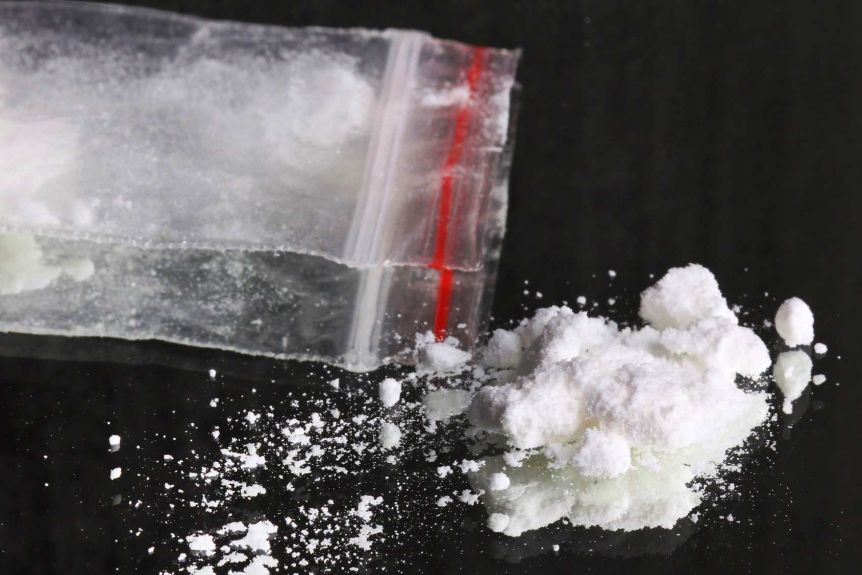Methamphetamine-related hospital admissions drop due to coronavirus restrictions has doctors worried


The number of methamphetamine-related presentations at WA emergency departments has fallen significantly during COVID-19, while the drug's street value has skyrocketed.
Experts believe supply-chain disruptions during the pandemic could be driving the price surge, and have concerns drug users will take up other, potentially more dangerous drug combinations.
Meth-related hospital attendances were down 29 per cent in April compared with the average numbers seen between January and March.
A total of 669 people attended an ED because of methamphetamines in April, compared with 977 in January.
Similarly, admissions were 34 per cent lower in April than the preceding three-month average.
Drug-related presentations overall decreased 23 per cent in April compared with the preceding three months.
Concern drugs being adulterated
The Australian Medical Association of WA's emergency medicine spokesman Dave Mountain said this was in line with an overall drop in emergency department attendances and admissions, which were down almost 30 per cent.
"When people come in with meth they are normally very messed up, on the high end of acuity and they cause a lot of problems in EDs," Dr Mountain said.
"It is surprising that their attendances have dropped the same amount as everybody else in the community."
Dr Mountain said he was concerned a supply shortage could result in drug users substituting their usual drug.
"We are a bit worried about what the long-term effects will be with adulterated drugs, people using different substances, or using things where there is even less control," he said.
"We have started to see some evidence of that coming in. There have been some cases that have ended up in intensive care which we think are due to adulterated drugs.
"We saw the same when opiates became short of supply and everybody started substituting methamphetamine for opiates and people weren't used to the drug, so they would get themselves into more trouble."
Dr Mountain said medical staff were "delighted" with the decrease in drug-related presentations, but also feared a "rebound phenomena".
"The drugs will come back on board; same price, same quality, and people will have lost tolerance and get themselves into more trouble," he said.
He said international and interstate travel restrictions may have disrupted supply chains, leading to a downturn in availability.
"We've had some anecdotal reports both here and across the country, and indeed from colleagues internationally, that prices for illicit drugs have skyrocketed in a number of places," he said.
Ice seizure despite border closure
But a massive ice seizure this week proved a hard-bordered Western Australia — the so-called "island within an island" — was not impenetrable.
Police seized 12.2 kilograms of meth, believed to have a street value of roughly $12 million, which had crossed the border concealed inside a road train.
WA Police Minister Michelle Roberts said despite the price of meth indicating the border had made a difference, it would not be adopted long-term.
"Drugs come into the community, not just by the road network, they also come in via airplane and boat," she said.
"Everyone wants to be able to travel again — to go overseas and interstate in the future — and it is just not possible for police to search every vehicle, every plane, every parcel and suitcase."
But authorities were considering maintaining stricter border enforcement of remote Indigenous communities based on positive feedback about a reduction in drugs circulating since the pandemic, she said.
Drug cost now prohibitive
Palmerston alcohol and drug rehabilitation service chief executive Emma Jarvis said drug users had reported a significant increase in the street price of methamphetamine.
"Clients have been telling our counsellors that supply of methamphetamine has significantly reduced and that means that price has at a minimum doubled, to the point where many clients are choosing not to use the drug anymore because they can't afford it," she said.
"They have also made comment that what has been there has been so adulterated that they don't actually want to use it.
"For people who are using, the opportunity to work on their recovery, that might be a good thing."
She said matching the reduction in supply with strategies to reduce demand would be critical.
"Demand reduction is preventative strategies around increased employment, positive mental health strategies," she said.
Ms Jarvis said there had been other positives for drug users trying to rehabilitate during the pandemic, with an increase in recovering addicts choosing to extend their stays in rehab and a shift to online counselling sessions resulting in more engagement and fewer no-shows.
Australian Criminal Intelligence Commission CEO Michael Phelan recently told a parliamentary law enforcement committee supply chains seemed to have been disrupted during COVID-19, but more empirical data was needed.
"We don't know whether it's opportunism — it's just someone taking the opportunity through COVID-19 to say 'we've got a shortage', and therefore up their wholesale price by up to 20 per cent — or whether it actually is genuine," he told the committee.
Mr Phelan said the National Wastewater Drug Monitoring Program, which analysed drug use by testing treatment plants across the country, would provide a clearer picture.
Its report, which will analyse sampling undertaken during the pandemic, is expected in October.
 Pathways Drug Rehabilitation Luxury Addiction Treatment & Detox Center
Pathways Drug Rehabilitation Luxury Addiction Treatment & Detox Center


